How to Prepare for GMAT Verbal Reasoning | Verbal for GMAT PDF Download
Scoring high on the GMAT Focus Verbal section is an important part of earning an impressive total score on the GMAT Focus Edition. Furthermore, business schools generally prefer to see “balanced” GMAT Quant and Verbal scores as opposed to wildly divergent ones, because both quantitative skills and management-level reading and analytical skills are necessary for success in business school.
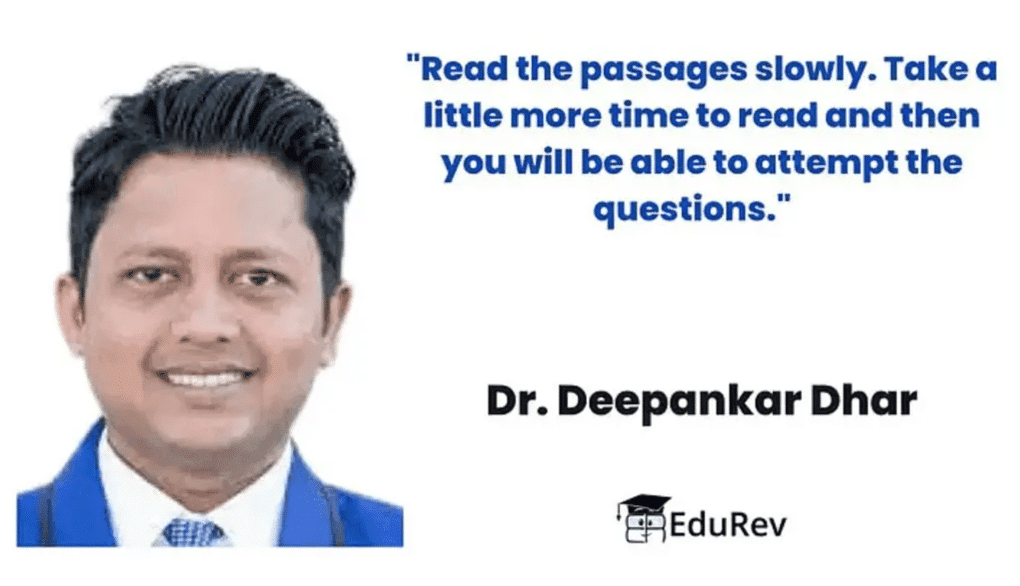
Approach to Attempt Verbal Reasoning Questions
1. Understand the game: While it is true that you need to know a number of English grammar rules and understand some other verbal concepts in order to perform well in GMAT Focus Verbal — it would be a flawed strategy to assume that everything will simply fall into place if you memorize a ton of rules and concepts.
To master the Verbal section of the GMAT we have to not only learn concepts but also develop skill in noticing what is going on in questions and using logic to arrive at correct answers.
2. Use a topic-by-topic approach: In preparing for GMAT Verbal, you have a considerable amount of content to learn, and you want to make sure that you don’t leave any gaps in your knowledge, your best move is to take an organized and methodical approach to your preparation. Learning just one Verbal topic at a time is the best way to ensure that you truly master each topic as you learn it and that you don’t leave any gaps in your knowledge or skip anything that could come back to bite you on test day.
To keep your Verbal study efficient and effective, learn just one Verbal topic at a time, starting with basic concepts and progressing in a linear fashion to more advanced ones.
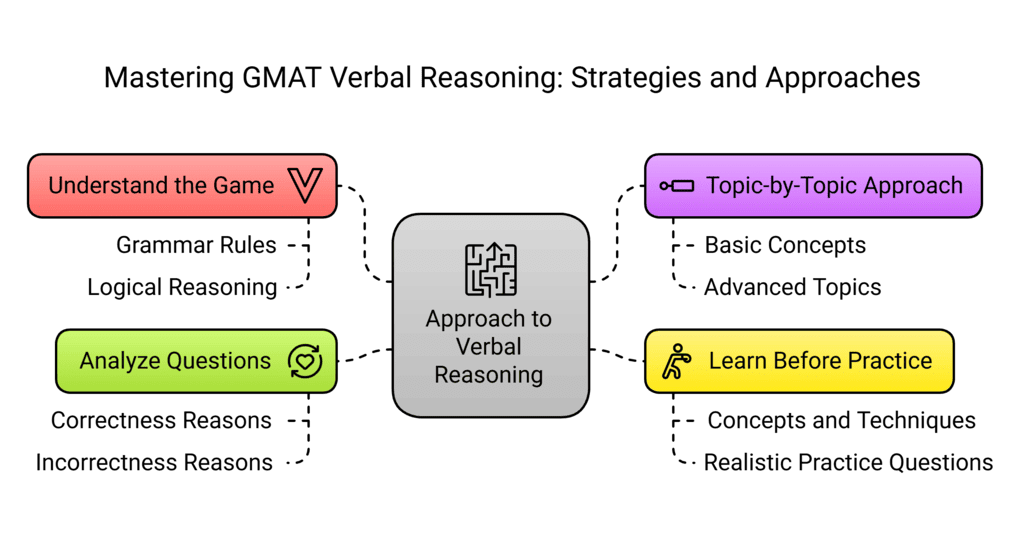
You can find all topics of Verbal for GMAT here.
3. Learn before you practice: Unless your baseline Verbal score is already very close to your goal score, doing practice questions probably won’t be enough to close the gap. First, build strong foundations in both the concepts and techniques related to a Verbal topic, and then answer practice questions involving that topic.
As you learn each Verbal topic individually, first learn the concepts and techniques related to the topic, and then practice with a large number of realistic questions on the topic.
4. Analyze Questions: Treat each answer choice as if it were a question, and seek to identify and clearly articulate precise reasons why each answer choice you see is incorrect or correct. Don’t choose an answer until you have fully analyzed and understood every choice.
To develop strong GMAT Verbal skills, when analyzing practice questions, treat each answer choice as if it were a question, and articulate specific reasons why each answer choice is incorrect or correct.
The blueprint of the types of questions asked in verbal reasoning is:
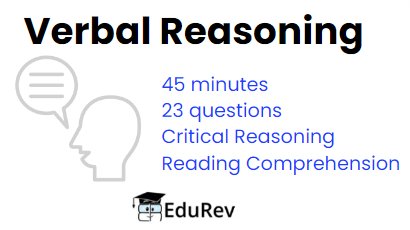
GMAT Reading Comprehension: Categorizing RC questions
Categorizing RC questions will proliferate your ability to interpret GMAT Verbal Ability as a whole section. This means you would be able to enhance your ability to comprehend what sort of questions are being asked in the GMAT verbal section, how best to answer them and what it takes for a test taker to perform that on-spot mental exercise. You will also be able to analyze the questions to identify essential bonds and the unsaid repercussions directed toward the continuation of the excerpt. Here are some of the most prominent types of RC questions asked in the GMAT:
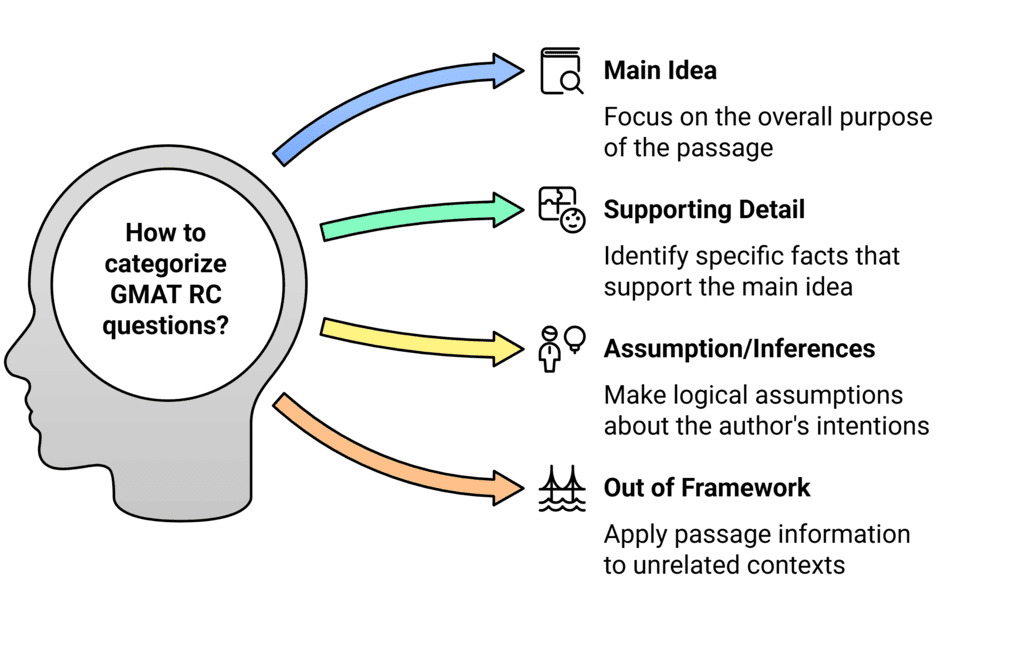
1. Main idea question:
- Main idea questions are one of the most common types of questions in the GMAT reading comprehension section. You’ll find at least one main idea question in all the passages.
- In these questions, you need to identify the answer choice that matches the scope of the entire passage.
- The key here is to think of the big picture and not get distracted by the individual elements. Put all the pieces together and try to figure out what is the essential purpose of the passage.
2. Supporting detail/ substantial idea question:
- These questions are trickier than the main idea questions. Supporting detail/ substantial idea questions on the other hand requires a thorough reading on your part.
- These questions may ask about facts or specific arguments that are explicitly cited in the passage. Although, these facts mostly support the main idea that the passage talks about.
3. Assumption/inference:
- Assumption/inference types of questions are more advanced than the two mentioned above and would require more of your critical thinking abilities.
- Unlike the supporting idea questions which ask about plain facts, inference-based problems talk about arguments and ideas that are implied by the author and are not mentioned explicitly in the passage.
- To answer these questions, you need to think logically and make some calculated assumptions about the author’s intentions.
4. Out of framework:
- Out-of-framework or out-of-context questions are, as their name suggests, not related to the passage directly. These questions ask you to absorb the information present in the passage and apply them in an out-of-context situation.
- These questions may ask you about the author’s views regarding a matter that is completely unrelated to the passage.
- In this instance, you need to take a similar approach as with the inference type question. However, please note that you may have to take a much farther logical leap than before.
- These questions primarily test your understanding of the main idea of the passage and your ability to apply it elsewhere.
5. Coherent logical structure:
- These kinds of questions talk about the overall structure of the passage. You’ll be asked what the author is accomplishing by writing this passage this particular way.
- For example, the question might be having the following wordings, “Does the passage refute an idea”? or “Is the author contrasting two ideas?”.
- Sometimes there can also be a question that asks for a suitable title for the passage. Coherent logical structure problems test your ability to understand the structural flow of the passage.
6. Author's style and tenor:
- Finally, there are style and tone questions that test your ability to identify the tone of the passage. You may be asked to identify the ideas in the passage and the tone used by the passage to express those ideas.
- Generally, the most common type of question will ask you to describe the style and tone of the passage using a single word or a phrase.
- For example, critical, enthusiastic, optimistic, objective, etc. are the frequent choices in those problems.
GMAT Reading Comprehension: Crucial Components of RC Passage
It may be easy to get carried away by the passage given. However, don’t lose focus on the topic or bring in your own ideas. Do not bring any worldly knowledge into the passage. Doing so would mean that your content is different from the actual content of the passage.
Identify the following things in the RC passage:
- Topic- What is the passage about?
- The scope- What aspect of the topic does the passage focus on?
- Purpose- Why did the author write the passage?
- What notes would you jot down on your noteboard?
Preparation Strategy for Reading Comprehension for GMAT
Your GMAT Verbal Ability score largely depends on Reading Comprehension. Here are some foolproof ways to structure and time your preparation for GMAT Reading Comprehension:
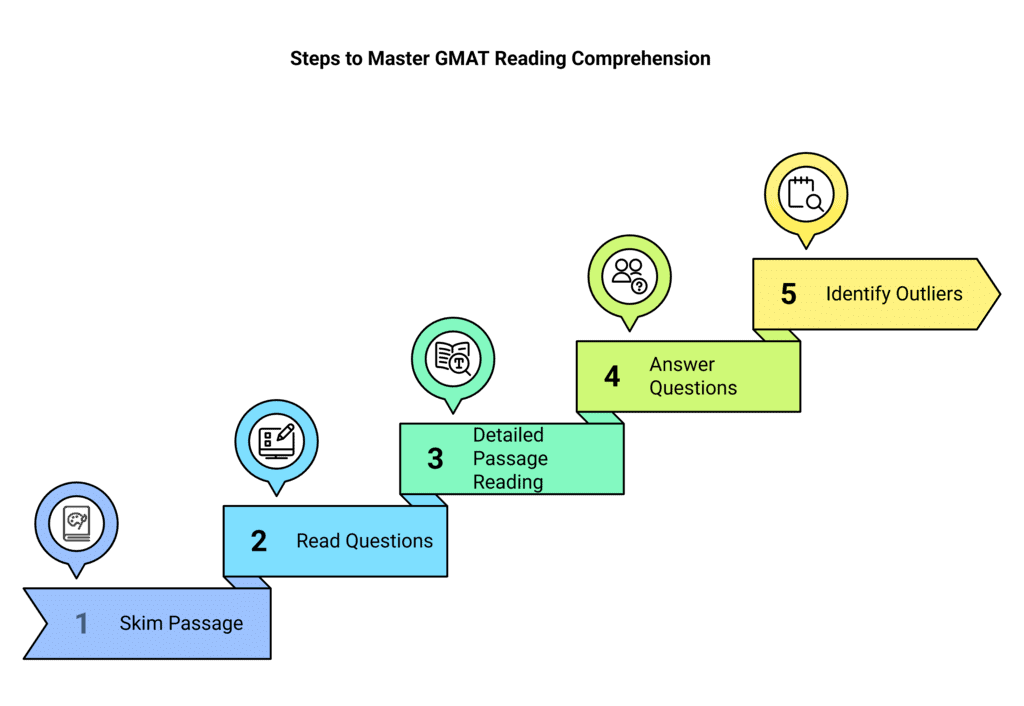 1. Skim the passage [1 minute]:
1. Skim the passage [1 minute]:
- Skimming the passage refers to a quick reading of the passage being given. It is slightly different from scanning where you are looking for a fact or a piece of information that is explicitly mentioned.
- Whereas skimming requires a quick reading of the entire passage to get a general idea being portrayed. Here the goal is not to look for details but to get the overall tone and idea of the passage.
2. Read the questions [1 minute]:
- After skimming, you should give a quick glance at the problems that are related to the passage. Read the questions carefully and identify what the type of questions are.
- The type of questions is mentioned above for your reference. Mark each of the questions according to their type and take a specific approach to each of them as required.
3. Read the Passage in detail [2 minutes]:
- After going through the questions, revert back to the passage and read it thoroughly.
- Unlike skimming where you skip over minute details, here you need to be focused and look for tiny intricacies and specific facts that are mentioned.
- However, given that GMAT is a timed exam you shouldn’t spend too much time on this step. It is advisable to be conscious of the time you’re taking with the section.
- Look for the information that is specifically asked in the questions and ignore other irrelevant information.
4. Answer questions [1 minute]:
- After a thorough reading, it is finally time to answer the questions. You should begin with the main idea questions first as they require relatively less mental effort.
- Then, you should build on that by answering the supporting idea questions after looking up the explicit facts mentioned.
- Ideally, you should proceed in the order mentioned above to be most effective.
- However, after answering these two types of questions in the beginning, you can move in any order of your preference.
5. Identify the outliers [0.25 minutes]:
- Outliers are those answer choices that are not mentioned in the passage explicitly but resonate with the question.
- You need to have a sharp eye for these answer choices and your understanding of the main idea of the passage should be strong.
- With your solid reasoning, you’ll be able to identify these outliers and use them to your advantage.
Preparation Strategy for Critical Reasoning
Here is how you can effectively prepare for Critical Reasoning in GMAT:
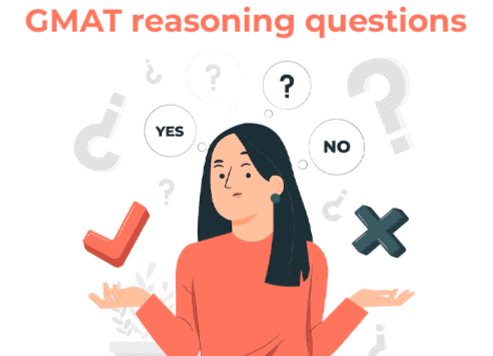
1. Follow the “map that leads to you”:
- You need to get to terms with the topic of critical reasoning. The GMAT critical reasoning questions have been deliberately built analytically and confusingly, where the usage of Jargon(difficult expressions) is encouraged and sentences appear to be in harmony with themselves rather than being helpful to the student.
- A candidate should deviate from spending time on incessant reading, but rather work out how best to decode controversial theories to find evidentiary clues that help in solving the question.
2. Believe that slow and steady wins the race:
- Being ambitious means being slow and steady towards your ambition. Speed reading can only help you get so far. You need to interpret what's going on in the question.
- This will help you understand the information provided from the data that needs to be assumed.
- Breaking the question down sentence-wise will help you mindfully assess the situation presented in the question.
3. Align questions with logic:
- It is not advisable for you to be wishy-washy with a critical reasoning question. You should align the question around your own analytical reasoning capabilities and then draw the necessary conclusions.
- Identify the dominant and the weak parts of the sentence and practice the technique of gathering information with respect to the contextual meaning of the question. This in turn can help you assume or predict the solution for a given question.
Practice is the Key to Success
- Consistent practice is vital for success, especially when aiming to excel in the verbal section of the GMAT Focus exam. By regularly practicing various reading comprehension passages and critical reasoning questions, you can enhance your skills significantly.
- It's crucial to grasp the concepts thoroughly before testing yourself to gauge your progress accurately.
- EduRev provides detailed results and analysis of your practice tests, allowing you to identify your strengths and weaknesses.
- By understanding where you excel and where you need improvement, you can focus your efforts effectively to achieve your target GMAT score.
- You can find Mock Tests for Critical Reasoning by clicking on this link.
- You can find Mock Tests for Reading Comprehension by clicking on this link.
|
31 videos|51 docs|36 tests
|
FAQs on How to Prepare for GMAT Verbal Reasoning - Verbal for GMAT
| 1. What is the best approach to attempt verbal reasoning questions on the GMAT? |  |
| 2. How should one categorize GMAT reading comprehension questions? |  |
| 3. What are the crucial components of a GMAT reading comprehension passage? |  |
| 4. What is a good preparation strategy for reading comprehension on the GMAT? |  |
| 5. How can one prepare effectively for critical reasoning questions on the GMAT? |  |

















